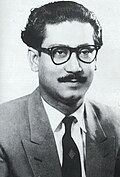Background
In the previous provincial election in 1954, held in the backdrop of the Bengali language movement, the Awami League, Krishak Sramik Party and other smaller parties formed an alliance called United Front (Jukto Front). The Jukto Front won a landslide victory by winning 223 of the 309 seats. The Muslim League, once the most popular party in the province, had its worst-ever defeat, with many provincial ministers, including the chief minister of East Bengal, losing their seats. [2]
In 1958, the military takeover by Field Marshal Ayub Khan overthrew all federal and provincial governments of Pakistan. [3]
Sheikh Mujibur Rahman became the leader of the Awami League in 1963 and became the strongest supporter of lifting martial law and restoring democracy. In the 1965 Presidential Election, Sheikh Mujibur Rahman openly supported and launched campaign along with his party for Fatima Jinnah. Fatima Jinnah gained more votes in East Pakistan than West Pakistan.
On 18 March 1966, Sheikh Mujibur Rahman placed Six-point movement during a conference held in Lahore which demanded more autonomy for East Pakistan. It was rejected by then political parties of both wings but got huge support from the people of East Bengal. [4] In April 1966, Sheikh Mujibur Rahman demanded to conduct a nationwide referendum on his six-point movement and said that military establishment is exploiting East Pakistan by using all export revenue of jute to feed the army. [5]
He was arrested in April 1966 in Jessore but was bailed out soon. He was again arrested on the orders of Ayub Khan in May and sent to Sylhet jail where he was charged in the Agartala Conspiracy case along with 28 East Bengali military and government officials. After huge protests against the arrest of Sheikh Mujibur Rahman across East Pakistan, all cases were withdrawn and he was released. [6]
A month before elections the deadliest tropical storm hit East Bengal which claimed lives of at least half a million people. [7] Poor response from then government of Pakistan skyrocketed popularity of Awami League. President Yahya Khan was strongly criticized by international media due to its poor disaster governance. [8]
This page is based on this
Wikipedia article Text is available under the
CC BY-SA 4.0 license; additional terms may apply.
Images, videos and audio are available under their respective licenses.


